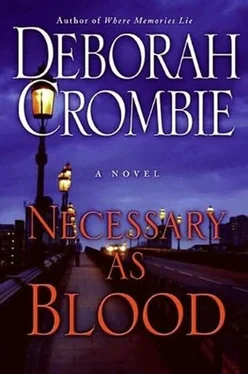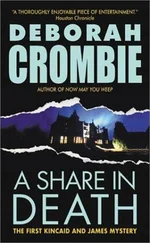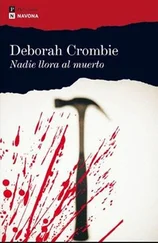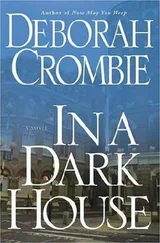“You think Weller’s involved in this somehow?”
“No. Why would he have called us in if he was?” Kincaid shook his head. “But there’s something…I just haven’t quite put my finger on it yet.” He looked round. Shops were closing, passersby carried bags of shopping, and the front of the church had begun to take on a faint gold glow in the western sun. “I’ve got to go, as well. I’m going to stop in at Naz Malik’s house.”
“I’ll come with you,” offered Doug.
“No, you go on, Doug. I won’t stay long. And you should have a look at some more flat adverts.” He clapped his sergeant on the shoulder. “I don’t want you to lose your momentum.”
Fournier Street was a canyon of shadow. The chimney pots looked starkly uniform in the flat light, marching across the tops of the terraces like rigid orange soldiers. Kincaid found the house easily in the short row. There was no crime scene van in the street, and when he tried the door, it was locked. He took out the copied key Sergeant Singh had given him before he left Bethnal Green, unlocked the door, and stepped in.
The house was shuttered and dim. He fumbled a bit for the switch-in these old houses, the wiring was often exposed, and terminated in odd places. In this one, the switch for the entry hall was coupled with the switch for the sitting room, and was just outside the sitting room door. His fingers came away smudged with black-the fingerprint demons had made their appointed rounds.
The illumination revealed more black dust: the doorknobs and stair rail, the handlebars and crossbars of the bike that stood propped against the wall, the jauntily flower-decaled helmet hanging from one rubber grip.
He looked into the sitting room, then went downstairs to the kitchen, where he checked to make sure no rubbish had been left in the kitchen bin. As far as he knew, the house had no caretaker, and the odor of rotting garbage could permeate the place quickly. Someone had tidied, however, either Naz Malik’s nanny or the SOCOs-or Gemma.
Returning to the ground floor, he stood for a moment, wishing he had seen the house the way Gemma had seen it on Saturday. It would still have had human presence then, a pulse of life and energy. Now it had taken on the too-quiet pall of the uninhabited. The air felt stale, unused, and the fingerprint dust gave the rooms an atmosphere of shabby neglect.
And as he stood in the stillness, Kincaid realized something else. In spite of the differences in age and architectural style, this house felt very much like their own. There was the same comfortable feel to the mix of contemporary and antique furniture, the splashes of rugs and artwork, the clutter of books and children’s toys.
Gemma would have felt very much at home here. Perhaps that had contributed to her attachment to the child.
He climbed the stairs, looking briefly into the rooms on each landing, finding he liked the little eccentric touches. Sandra’s influence, he guessed, remembering the conservative tidiness of the reception room in Naz Malik’s office, echoed here in the office he kept at home. He didn’t spend time looking through Naz’s papers. The computer was gone, in the hands of the boffins, and he would have Doug, whose father was a solicitor, look through anything that remained.
Reaching the top floor, he felt again for the light switch, then stood there, dazzled. Gemma had described Sandra’s collages, but he supposed he had visualized something dated, slightly fussy, if he had bothered to think about it at all. Nothing had prepared him for the blaze of color and shape that leapt out to meet him. He moved closer, drawn to study the work in progress on the table, others propped against the walls.
The images were not as abstract as he’d first thought. They teased mind and eye, as the hauntingly familiar merged into the unexpected. In one, the glass towers of the City dwarfed small shop fronts in crumbling buildings. Bright-colored bolts of fabric spilled, like fallen bodies, from the shop doorways.
Kincaid dragged himself away and went to the white trestle table that apparently had served Sandra as a desk. Over it hung a large painting of a red horse on a white ground, and he realized that nowhere in the house had Sandra displayed her own collages.
The desktop was a jumble of notebooks and loose papers, and he saw at once that it would take more time than he had that evening to go through the clutter. But he picked a few things up idly-a sketchbook filled with drawings and jottings, a folder of press cuttings from gallery shows, a bound album filled with photos and handwritten captions. When he looked more closely, he saw that the photos were all of Sandra’s installations, with the captions noting the place.
A school, a library, several in what appeared to be corporate offices, a local clinic, some private homes and businesses-Kincaid had flipped through to the end of the album, now he went back more carefully, looking for the notation that had caught his eye.
There. The collage was more representational than most, and depicted a narrow, canyonlike street, its wall of buildings broken by the flower-draped facade of a pub, and by recesses that held small sculptures of various traditional tradesmen, and incongruously, a tilting cannon.
The caption read: Lucas’s good-luck piece. Not sure he appreciated the joke .
Lucas. Lucas Ritchie. In the photo, the collage hung in an elegant, high-ceilinged lounge.
Kincaid recognized the pub, the Kings Stores, in Widegate Street, near Artillery Lane. He vaguely recalled the sculpted tradesmen set into the recessed alcove on the front of the building next door, but he was sure there was no cannon. Had that been a private joke between Sandra and Ritchie-some play on Artillery Lane and perhaps loose cannon?
In any case, that gave him enough to go on. If the collage was a representation of the club, he would start in Widegate Street.
Only then did Kincaid examine the photos tacked to the corkboard on the far wall, and he stood there for a long moment. Sandra Gilles-for it was obvious that Sandra had been the primary photographer-had not posed her subjects, but had captured the family in a testament to the ordinary: eating, talking, cooking, playing, reading. His throat tightened and he swallowed, blinking as he gazed at a snap of a little curly-haired girl, her faced pinched tight with concentration as she drew with a crayon.
Charlotte . Charlotte Malik. He would never again think of her as “the child.”
A thought struck him and he looked round the studio, examining Sandra’s worktable and desk, shelves and baskets. It was obvious that Sandra had been an avid and talented photographer. Where was her camera?
Gemma pulled up in front of Betty Howard’s house just as Hazel walked out of the door and started down the steps. She’d tried ringing Hazel once more and, getting no answer, had asked Wes to wait for the boys, then bolted out of the house.
Now, she pulled the Escort awkwardly into the curb and jumped out. “Hazel!”
Hazel looked up. “Gemma. I was coming-”
“What are you doing here?” Gemma found she was trembling with a surge of anger mixed with relief. “Why didn’t you answer your phone? Tim’s been worried sick about you. I’ve been worried sick about you-”
“I didn’t mean…I forgot I’d turned it off.” Hazel dug in her bag for the phone and switched it on. Then her eyes widened in horror. “Oh, god, is Holly all right? I didn’t think-”
“No, no, she’s fine,” Gemma assured her, regretting her outburst. “I just saw her an hour ago. But you’ll have fifty million voice messages from Tim and me.” Gemma noticed that although her friend still looked gaunt, her hair had been washed and her clothes were clean. “Are you all right?” she asked, her anger evaporating.
Читать дальше












